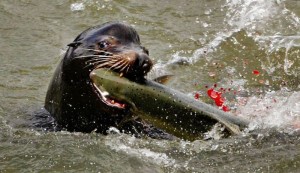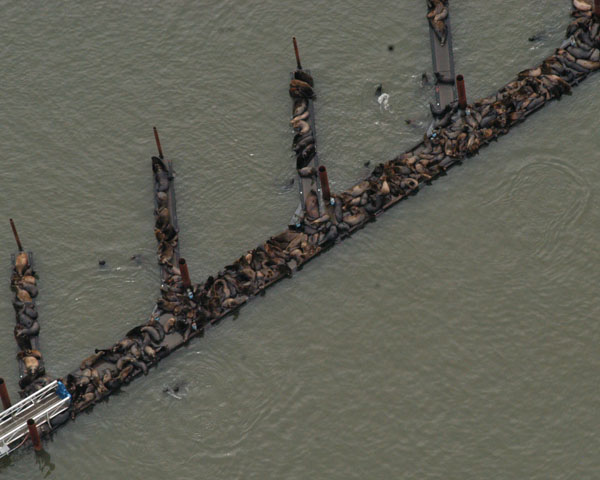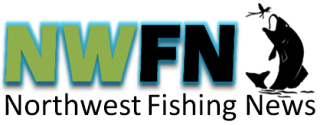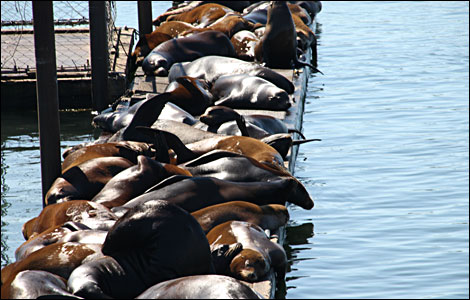Portland, Ore. (AP) – The Oregon Department of Fish and Wildlife (ODFW) in cooperation with the Washington Department of Fish and Wildlife (WDFW) have reached a joint decision to close the Columbia River to fishing for spring Chinook salmon.
Jim Unsworth, director of WDFW, stated in an email to the AP this morning that these actions were necessary to ensure that the quota allotted to the pinnipeds of the Columbia River is met. During the 2014 North of Falcon season setting process negotiations with the Pinniped Salmon Harvesters Union (PSHU) 40% of the forecast return were allotted to the sea lions.
Sport fisherman have flocked to the Columbia to fish for spring Chinook for years. The news comes as a shock to many charters that operate out of Longview, WA.

Said Bob R. Downey of Columbia Sport Fishing Charters, “I guess it’s only fair. The sea lions need to eat too, and it’s more important to me that we maintain our fisheries while letting nature take its course.” Downey told the AP that he is going to start redirecting the focus of his operation to the lakes around southwest Washington, targeting the abundant trout and kokanee that WDFW has planted. “My clients want to catch fish. They don’t fight as hard, but you can keep 5 trout in most of those lakes, and if you use a lighter action rod, they can be a lot of fun.” Downey remarked.
In response to these closures, the Unsworth and the WDFW commission have approved $755,093 in funding for 14 enhancement and restoration projects recommended by the Fish Restoration and Enhancement Board. These projects will focus on moving the sport fisheries of Washington and Oregon from the rivers to the lakes of the northwest. According to Unsworth, “The opportunities available from hatchery produced trout native to the PNW will save millions of dollars and help us to preserve the 40% of spring chinook that we have set aside for the seals. We continue to provide excellent fisheries in our lakes, and we’re proud of the progress that we have made feeding and housing these sea lions.”
The fishery will be closed until further notice. Over 6,500 sea lions and seals have convened for their annual spring Chinook festival on the tide flats near Longview. Several charter boat captains have transitioned to seal watching trips in leiu of the closure. Said Downey “It’s amazing to watch. They take one bite from a salmon, spit it out, and move on to the next one. It’s like a buffet. You can’t always eat all the stuff at the salad bar, but you put it on your plate anyway, you know, because it’s all you can eat.”

PETA has released a statement in support of the ban this morning. “It’s about time that the rights of these magnificent creatures is recognized. For too long we have been letting sport fisherman torture and murder these beautiful creatures, while the sea lions go hungry.”
Below is the text of the press release from ODFW –
Emergency Closure: Columbia River guided fishing and sports fishing opportunities for Spring Chinook
April 1, 2015
Actions: Close Columbia River and all tributaries downstream from Bonneville dam to sport fishing of Chinook (king) salmon until further notice.
Species affected: Chinook salmon
Fishing area locations and effective dates:
The Columbia River and its tributaries downstream from Bonneville Dam will close to sport fishing at 12 AM on March 30, 2015
Reason for changes:
ODFW in cooperation with WDFW and NOAA have documented over 12,000 known harbor seals and California sea lions roaming the Columbia River and its tributaries. Many are now living year around in these rivers and tributaries. Recent studies have shown that these pinnipeds will eat up to 40% of the return of upriver spring Chinook salmon.
The closure is necessary to ensure sufficient numbers of Chinook reach the spawning grounds and hatcheries to maintain future runs. Significantly lower numbers of spring Chinook have been counted than the 2015 forecasts predicted, and the allotted quota of fish to the pinniped population cannot be reached without the closure of sport fishing.
Other information: Anglers should consult the Fishing in Washington, Sports Fishing Rules pamphlet for other specific regulations.
We encourage the public to contact your local representatives with your recommendations for alternatives to fishing and hunting so we all can enjoy the offering of the outdoors here in the beautiful Pacific NW.
Information contact: April Foolishberger, Oregon Dept Fish and Wildlife
More details are available in the Oregon-Washington Pinniped Conservation- Protection and Management 2015 Annual Report


